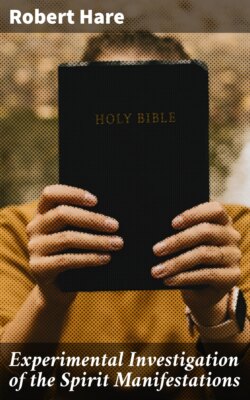Читать книгу Experimental Investigation of the Spirit Manifestations - Robert Hare - Страница 25
На сайте Литреса книга снята с продажи.
Letter of M. F. De Saulcy.
Оглавление318. “Sir:—You desire me to report to you my opinion in writing which I have formed as to the strange phenomena, to say the least of them, which have been conventionally called table turning and table talking. I am not the man to recoil from what I regard as a truth, whatever sarcasm may be reserved for such profession of faith, and therefore proceed to satisfy your inquiry.
319. “It is about eight or ten months since when the public of Paris was agitated by the late arrival of the fact from America and Germany; a fact which pure physics was not able to explain a priori. I did as many always do, and have no doubt done for a long time—received this account with the most determined incredulity, and, I confess, with ridicule. I considered its adepts as charlatans or as simpletons, and refused for a long time to bestow on it the least attention. I became tired of the war, however, and after hearing many affirm, to whom I could not apply these epithets, the reality of these facts, I determined to try for myself.
320. “My son and a friend were my two companions: we had the patience for forty-five minutes, seated at the table, to form what is called the chain, and were not a little surprised, I assure you, to see at the end of that time the table on which we were operating, and which was merely the parlour dinner-table, begin to move, and after some hesitation to contract a rotary movement, which, accelerating, soon became very rapid. We endeavoured by pressing to make it strike against the bar and arrest its motion, but could not succeed.
321. “After repeating the experiment two or three times, I sought to find some cause in physics for the movement, and battled the whole theory of Electro-Dynamics with the aid of an electroscope, compass, iron-filings, iron, &c. As I could not detect the least trace of electricity, I thought then of impulses due to the volition of the operators, and of which a sort of integration might cause the motion of the table. On that I stopped, and for several weeks did not give the smallest attention to a phenomenon which did not seem to merit any further notice.
322. “Finally was commenced the faculty of talking, and I assure you my incredulity was considerably greater than when its moving power was announced. I was sparing, however, in my epithets, for I soon found myself an investigator. I watched the rogues, as I suspected, for two hours, but left the room a full believer of its reality, without any further examination, confirmed too by all subsequent experiments. (1.)
323. “What could be said indeed of the fact witnessed together, that a crayon, which was fastened to the leg of a table, wrote legible words, while we were pressing it down with our hands?
324. “It was then, sir, that your book fell into my hands. I have read it with the most lively interest; have admired your erudition, and the courage necessary at our epoch to treat such a subject.
325. “I believe in the existence of facts which often volition is unable to produce, and over which I declare that volition sometimes appears to have a manifest influence. I believe in the intervention of intelligence DIFFERENT FROM OUR OWN, and which puts in action means almost ridiculous.
326. “I believe that the Christian religion should not encourage the practice of these experiments. I believe there is danger in allowing them to become a habit, and at least we may lose the little reason which has been granted man by the Giver of all things. I believe, finally, that it is the duty of an honest man to dissuade others from occupying themselves with it, in preaching, by example, and not allowing it in the least to occupy himself.
327. “This is the end I have reached after some months’ experience; and, ask permission to close this letter, already too long, by repeating a very wise saying of a man of high intelligence: ‘Either these phenomena are, or are not real; if not, it is disgraceful to lose time with them; if they are, it is dangerous to invoke them and to make them a pastime.’
Please accept, &c.,
F. De Saulcy,
Member of the Institute.”
